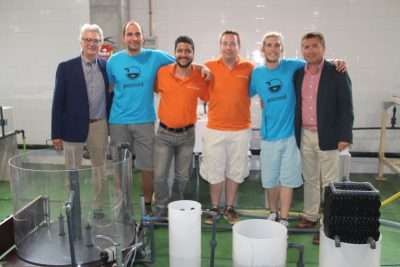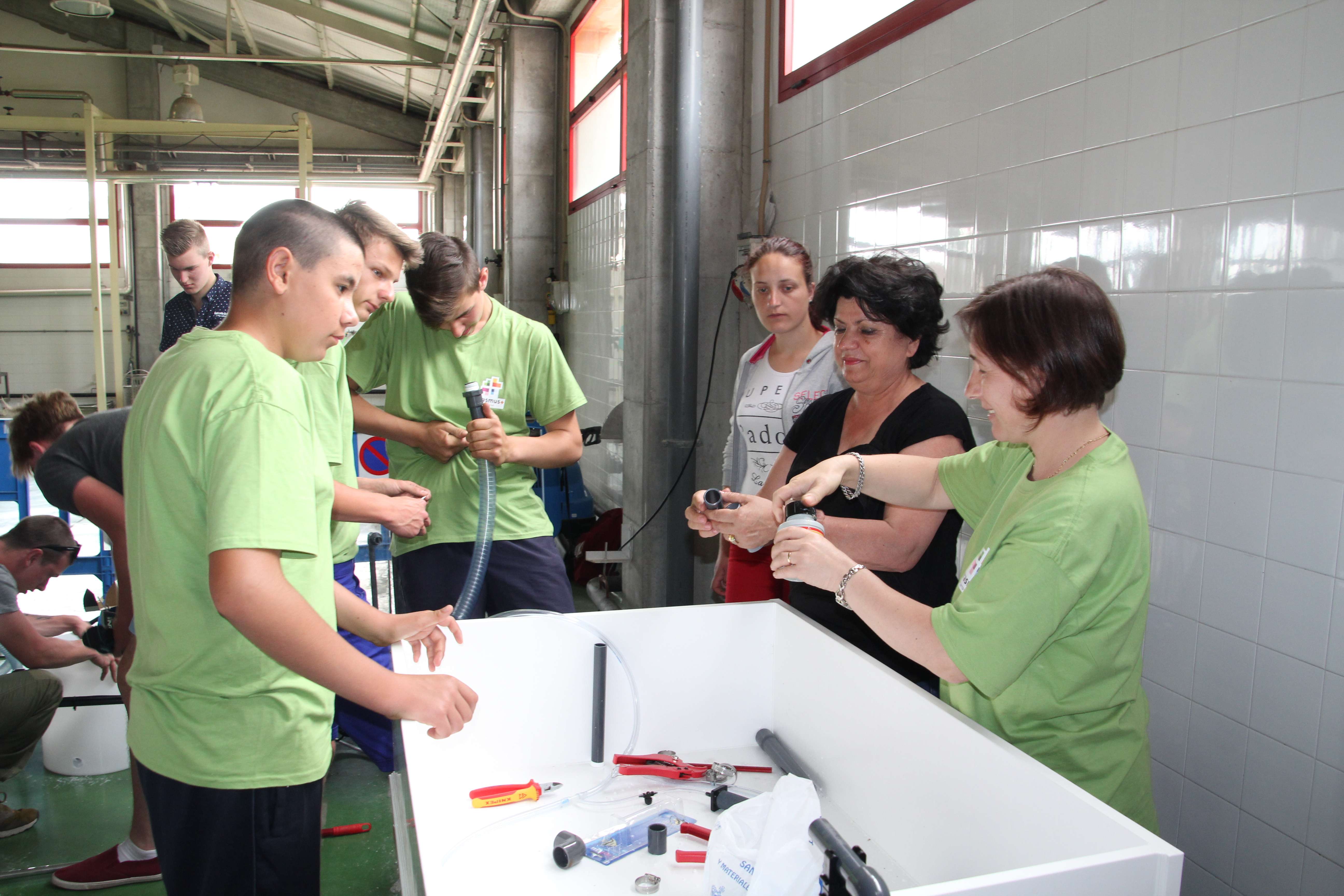From 7th till the 13th of May ANNIE organised an Aquaponics Training Course at CIFEA Molina de Segura, one of the partners.
LandingAquaculture provided the training. 4 Trainers
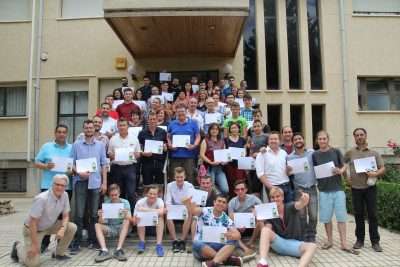
ANNIE – Aquaponics New Novelties In Education
KA2 – project 2016-1-NL01-KA202-023006
Aquaponics is a circular system where aquaculture (fish farming) and hydroponics (plant breeding in water) come together.
The cycle starts with the feeding of the fish to produce ammonia rich waste, which accumulates in the water. The effluent-rich water is essential for plant growth. So the waste water is pumped to the grow beds. The bacteria that is cultured in the grow beds helps to break down impurities and as a result, nitrogen remains, which is an essential nutrient for plants. The plant roots filters the water which now contains nutrients for the fishes, and is pumped back down to the fishes.
Aquaponics is sustainable. Because the food is grown locally and not from far flown. And without the use of pesticides and antibiotics, so it is even healthier and fresher. Aquaponics also supplies ten times more food per square meter, with a minimum of water consumption. This makes it ideal for urban areas and dry, nutrient-poor countries. Aquaponics can thus contribute to futurefood problems, the reduction of CO² emissions and 9/10 may reduce the use of precious drinking water for irrigation.
ANNIE is a transnational Network Project in KA2
Partners are:
From Spain:
- CIFEA Molina de Segura
- CIFEA Torre Pacheco
- Servicio de Formación y Transferencia Technológica –Regional authority
From Romania:
- EUROPEA ROMANIA
- Liceul Tehnolologic Agroindustrial ¨Tamási Áron¨
- Colegiul Agricol ¨Dimitrie Petrescu¨
From Slovenia:
- Grm Novo mesto – center biotehnike in turizma
From United Kingdom:
- Askham Bryan College
From Portugal:
- Escola Profissional de Agricultura e Desenvolvimento Rural de Marco de Canaveses

From Netherlands:
- Wellantcollege
- InHolland – Applied Sciences Agriculture
Company:
- Youmanitas – Energy Farms Foundation
- OECON Group – Consulting Firm
(ANNIE) Aquaponics New Novelties In Education for feeding tomorrow’s cities is a project in which all participating countries will begin sharing good practices and creating a network of educational institutions, rural and urban companies/farmers, regional governments and local authorities. The global urbanisation trend means new challenges for food production and processing, and the needs of citizens. Safe food and water, food quality and the origin of these products are of major importance.
The ANNIE network has as underlying goal: establishing aquaponics training centres in which diverse target groups will be trained at any European Qualification Framework (EQF) level. The target groups focused on are youth, unemployed youngsters (up to 27), disabled people disadvantaged in the labour market, lifelong learners (EQF 2), immigrants and career changers.
Working in aquaponics requires both high-tech skills and hands-on labour. The partners in this project are from different European areas and have various reasons for participating: Spain, Greece and Portugal because of the lack of fresh water; Romania, Portugal and Slovenia to develop their rural areas; and the UK and the Netherlands as knowledge-based economies with too much (dirty) water, which should be re-used more sustainably.
Education plays an important role in these new developments, teaching the workers of the future and making them aware of the future food problems. The main goal of this project is to create and expand a network of educational institutions and farmers interested in aquaponics production and local governments aware of the ecologic and economic advantages of aquaponics. There are also links to water technology and innovative, sustainable breeding techniques requiring new curricula. The ANNIE project intends to expand the network in which education, farmers (business) and governments work together to raise awareness of what to do about the enormous changes as a result of the water scarcity, technical revolutions and consumer requirements leading up to 2050.
International knowledge centres must be created by educational institutions; this project will investigate opportunities for aquaponics training centres where students of all ages acquire knowledge, skills and competences to set up an aquaponics business themselves to become providers of local, fresh and healthy food. Enterprise will be encouraged. Aquaponics allows people to start their own business with small investments. It is the food production technique for the future according to scholars, engendering all sorts of activities. Aquaponics creates jobs at all EQF levels and across sectors.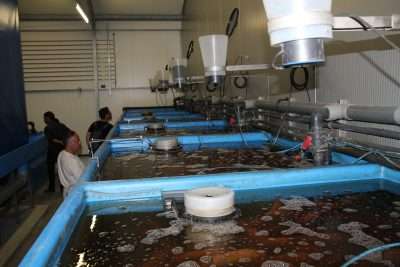
The food sector which aquaponics forms part of faces a tremendous challenge in feeding the world in the next 40 years, as more than 50% of the world population lives in urban areas. Aquaponics can cover part of the food supply on a small scale, close to consumers. Fresh food, fish and vegetables are available everywhere where an aquaponics system is working. For this new way of thinking about food production in an effective, but sustainable way, green education needs new curricula, which requires the market (business and local governments) becoming involved in changing the curricula. These network partners are very much aware of what needs to change to feed the next generation as well as is being done today. The ANNIE network can help to create an optional part of the green curricula or new courses for life-long learning programmes.
ANNIE outcomes will include:
- all partners testing the dimensional cross-sector cooperation between triple helix partners in their own region;
- all three sections of the triple helix being represented in every national network and all of them have contributed at least one good practice;
- six good practices from the educational partner institutions implemented/used abroad;
- six good practices of business partners monitored in the project;
- two good practices of governmental partners (Rijnmond/Rotterdam and Murcia);
- eight new relationships from the triple helix in the network;
- four guest lecturers invited;
- five field visits organised;
- 30 student exchanges and work placements organised by the educational partners.
Table of contents for aquaponics workshops
Workshop structure:
- Mornings (08:30 –13:45): lectures covering the content of the aquaponics workshop
- Afternoons (15:00-18:00): construction and assembly of two model aquaponic systems. The construction will include pipework preparation and assembly, connecting fish tanks, water filters and plant growing systems together and running the systems with water
- Trainers are available every afternoon for questions and individual help
Workshop schedule: 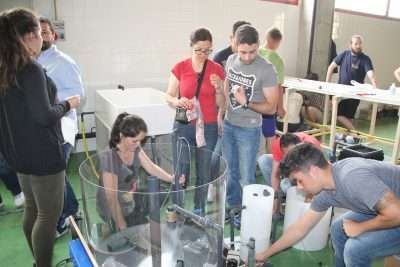
Day 1 (theory and system assembly)
- Welcome
- Official opening by Murcia authorities
- Start workshops
- Introduction to AquaponicsState of the world fisheries and aquaculture
- History of aquaponic systems
- Aquaponic system principles
- Fish biology fundamentals
- Interactions with the aqueous medium
- Water quality requirements by fish
- Nutrition fundamentals
- Basic behaviour
- Main species
- Plant biology fundamentals
- Interactions with the aqueous medium
- Main species
- Environmental and nutritional requirements
Day 2 (theory and system assembly)
- Aquaponic/Hydroponic design fundamentals
- Design theory (fish tanks, plant growing systems and water filtration)
- Nutrient management
- Greenhouse engineering and climate control basics
- Introduction to construction materials
Day 3 – Field Trips (San Pedro – IMIDA research centre and boot trip to fish farms on the Mediterranean)
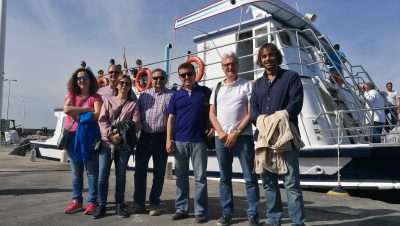
Day 4 (theory and system assembly)
- Understanding water transport systems, fluid mechanics and hydraulics
- How water moves through pipes and channels
- How water levels work in an aquaponic system
- Introduction to pumps and pumping systems
- Design guidelines for water transport
- Plant health and management
- Introduction to integrated pest management
- Pest and disease control
- Pest prevention strategies
- Pest monitoring methods
Visit Tilamur – European Project Aquaponics INAPRO at Lorqui
Day 5 (theory and system finishing)
- Fish health management
- Introduction to fish diseases in aquaculture
- Introduction to anamnesis and decision making when disease is present
- Biosecurity and disease control
- Common mistakes and pitfalls
- Aquaponic design Do’s and Don’ts
- Sound design guidelines
- Common mistakes
- Lessons learned from the industry
- Aquaponics business Do’s and Don’t
- Knowing your markets
- Analysing the capacity to fit in the market
- Alternative revenue sources
- Common mistakes and pitfalls
Commissioning of the two aquaponics models
Official closing of the training & showing the results
Issuing the certificates.
The training has been provided by LandingAquaculture NL.
Rob van der Ven, director and three trainers:
Carlos Espinal Venezuela
Gaspar Jersin Slovenia
Kevin Hartman Slovenia